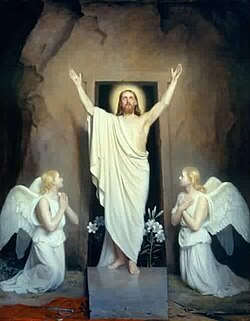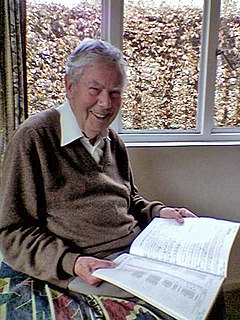
The Acts of the Apostles, often referred to simply as Acts, or formally the Book of Acts, is the fifth book of the New Testament; it tells of the founding of the Christian church and the spread of its message to the Roman Empire.

The Gospel According to Mark is the second of the four canonical gospels and of the three synoptic gospels. It tells of the ministry of Jesus from his baptism by John the Baptist to his death and burial and the discovery of the Jesus’ empty tomb. There is no miraculous birth or doctrine of divine pre-existence, nor, in the original ending, any post-resurrection appearances of Jesus. It portrays Jesus as a heroic man of action, an exorcist, a healer, and a miracle worker. He is also the Son of God, but keeps his messianic nature secret, with even his disciples failing to understand him. All this is in keeping with prophecy, which foretold the fate of the messiah as suffering servant. The gospel ends, in its original version, with the discovery of the empty tomb, a promise to meet again in Galilee, and an unheeded instruction to spread the good news of the resurrection.

The Gospel According to Luke, also called the Gospel of Luke, or simply Luke, is the third of the four canonical Gospels. It tells of the origins, birth, ministry, death, resurrection, and ascension of Jesus Christ.

The Gospel According to Matthew is the first book of the New Testament and one of the three synoptic gospels. It tells how Israel's Messiah, rejected and executed in Israel, pronounces judgement on Israel and its leaders and becomes the salvation of the gentiles. The gospel reflects the struggles and conflicts between the evangelist's community and the other Jews, particularly with its sharp criticism of the scribes and Pharisees: before the Crucifixion they are referred to as Israelites, the honorific title of God's chosen people; after it, they are called simply Ioudaioi ("Jews"), a sign that through their rejection of the Christ the "Kingdom of Heaven" has been taken away from them and given instead to the church.

The Gospel of John, the fourth of the gospels, is a highly schematic account of the ministry of Jesus, with seven "signs" culminating in the raising of Lazarus and seven "I am" discourses culminating in Thomas's proclamation of the risen Jesus as "my Lord and my God"; the concluding verses set out its purpose, "that you may believe that Jesus is the Christ, the Son of God, and that believing you may have life in his name."

Gospel originally meant the Christian message, but in the 2nd century it came to be used also for the books in which the message was set out; in this sense it includes both the four canonical gospels and various apocryphal gospels dating from the 2nd century and later.

The rapture is an eschatological concept of a minority of Christians, particularly within branches of American evangelicalism, consisting of an end-time event when all Christian believers who are alive, along with resurrected believers, will rise "in the clouds, to meet the Lord in the air."

Uchimura Kanzō was a Japanese author, Christian evangelist, and the founder of the Nonchurch Movement (Mukyōkai) of Christianity in the Meiji and Taishō period Japan. He is often considered to be the most well-known Japanese pre-World War II pacifist.
Gerrard Winstanley was an English Protestant religious reformer, political philosopher, and activist during The Protectorate of Oliver Cromwell. Winstanley was the leader and one of the founders of the English group known as the True Levellers or Diggers for their beliefs, and for their actions. The group occupied public lands that had been privatised by enclosures and dug them over, pulling down hedges and filling in ditches, to plant crops. True Levellers was the name they used to describe themselves, whereas the term Diggers was coined by contemporaries.

Jesus, also referred to as Jesus of Nazareth or Jesus Christ, was a first-century Jewish preacher and religious leader. He is the central figure of Christianity. Most Christians believe he is the incarnation of God the Son and the awaited Messiah prophesied in the Old Testament.

The Christ myth theory is the view that the story of Jesus is a piece of mythology, possessing no substantial claims to historical fact. Alternatively, in terms given by Bart Ehrman paraphrasing Earl Doherty, "the historical Jesus did not exist. Or if he did, he had virtually nothing to do with the founding of Christianity." It is a fringe theory, supported by few tenured or emeritus specialists in biblical criticism or cognate disciplines. It is criticised for its outdated reliance on comparisons between mythologies, and deviates from the mainstream historical view.

Hugh McGregor Ross was an early pioneer in the history of British computing. He was employed by Ferranti from the mid-1960s, where he worked on the Pegasus thermionic valve computer. He was involved in the standardization of ASCII and ISO 646 and worked closely with Bob Bemer. ASCII was first known in Europe as the Bemer-Ross Code. He was also one of the four main designers of ISO 6937, with Peter Fenwick, Bernard Marti and Loek Zeckendorf. He was one of the principal architects of the Universal Character Set ISO/IEC 10646 when it was first conceived.

Richard Cevantis Carrier is an American author and activist, whose work focuses on empiricism, atheism, and the historicity of Jesus. A long-time contributor to self-published philosophical web sites, including The Secular Web and Freethought Blogs, Carrier has published a number of books and articles on philosophy and religion in classical antiquity, discussing the development of early Christianity from a skeptical viewpoint, and concerning religion and morality in the modern world. He has publicly debated a number of religious scholars on the historical basis of the Bible and Christianity. He is a prominent advocate of the theory that Jesus did not exist, which he has argued in a number of his works. Carrier's methodology and conclusions in this field have proven controversial and unconvincing to specialists in the field, and he and his theories are often identified as "fringe".

Quakers, also called Friends, are a historically Christian denomination whose formal name is the Religious Society of Friends or Friends Church. Members of the various Quaker movements are all generally united by their belief in the ability of each human being to experientially access the light within, or "that of God in every one".
David Brazier is a British author and psychotherapist known for his writings on psychotherapy and Zen Buddhism. He is the leader of the Amida Order. Brazier describes himself as a "Buddhist priest, psychotherapist, social worker, and poet."
Nontheist Quakers are those who engage in Quaker practices and processes, but who do not necessarily believe in a theistic God or Supreme Being, the divine, the soul or the supernatural. Like traditional Quakers, also known as Friends, nontheist Friends are interested in realizing peace, simplicity, integrity, community, equality, love, joy, and social justice in the Society of Friends and beyond.

Maggy Whitehouse is an Independent Sacramental priest, a stand-up comedian a broadcaster and an author and specialist in Judaeo-Christian mysticism, particularly Bible interpretation for Interfaith.
Brendan Cathbad Myers is a Canadian philosopher and author known for his contributions in environmental philosophy, Druidry and Neo-Druidism, mythology, and applied virtue ethics.

Oral gospel traditions, cultural information passed on from one generation to the next by word of mouth, were the first stage in the formation of the written gospels. These oral traditions included different types of stories about Jesus. For example, people told anecdotes about Jesus healing the sick and debating with his opponents. The traditions also included sayings attributed to Jesus, such as parables and teachings on various subjects which, along with other sayings, formed the oral gospel tradition.
This is a list of encyclopedias and encyclopedic/biographical dictionaries published on the subject of cuisine, cookery and chefs in any language. Entries are in the English language unless stated as otherwise.









